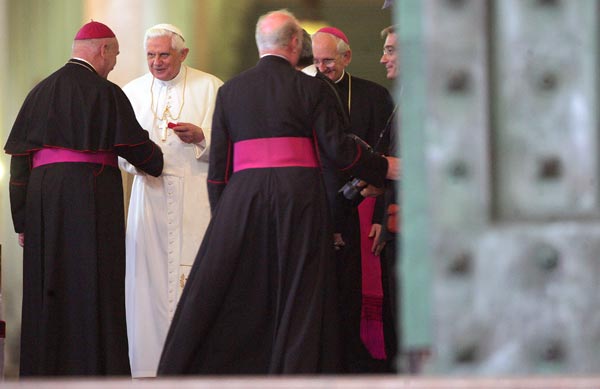What's in the Vatican Secret Archives ?
A whole lot of bulls—.

Tuesday, Oct. 16, 2007
A publishing house associated with the Vatican announced on Friday that it will publish copies of the Parchment of Chinon, a 700-year-old document about the Knights Templar that was uncovered in the Vatican Secret Archives in 2001. What other goodies do the secret archives hold?
Mostly administrative records. The archives, which were founded in the early 17th century, house records from the Vatican's day-to-day dealings—papal bulls, records of diplomacy, official correspondence, the records of apostolic nunciature (Vatican embassies), and more. (The Vatican Library, on the other hand, contains manuscripts on science, religion, and art that the Vatican has collected over the centuries.)
But that doesn't mean the documents are boring. The Vatican's "official correspondence" includes letters from King Henry VIII of England to Anne Boleyn (a Vatican spy swiped them because they proved the king's disloyalty to the Catholic Chuch) and from the infamous Lucrezia Borgia to her father, Pope Alexander VI. The Knights Templar papers are also meaty: They detail the investigation and subsequent punishment of the secretive order for, among other things, allegedly having inductees spit on a cross as an initiation rite.
For the most part, archival documents remain locked up unless they are released by a papal administration. For instance, in 1985, the documents from Pope Pius X's and Pope Benedict XV's tenures were made public. In 2006, the current pope, Benedict XVI, granted permission to release materials from 1922 to 1939, Pope Pius XI's era. (Traditionally, documents can be released after 75 or more years.) On occasion, though, documents unrelated to a certain pope's administration can made public, as with the Parchment of Chinon. In 2003, the pope decided to release some materials relating to the Vatican's relationship with Germany during the time period preceding World War II.
Despite the name, the archives aren't a secret in the hush-hush, classified sense. Instead, the word secret in this case means that the archives are private. To use them, you have to go through an application process and prove that you're a seasoned researcher with a specific project in mind—and specific documents that you're looking for.
Not all of the Vatican's important documents are stored in the Vatican Secret Archives. Others are housed in the Propaganda Fide, which contains records of the church's missionary efforts in Africa, Latin America, and elsewhere; the Archive of the Congregation for the Doctrine of the Faith, which deals with the church's teachings, including the Inquisition and forbidden books; and the Fabbrica di San Pietro, which houses materials about the building of St. Peter's Basilica.
